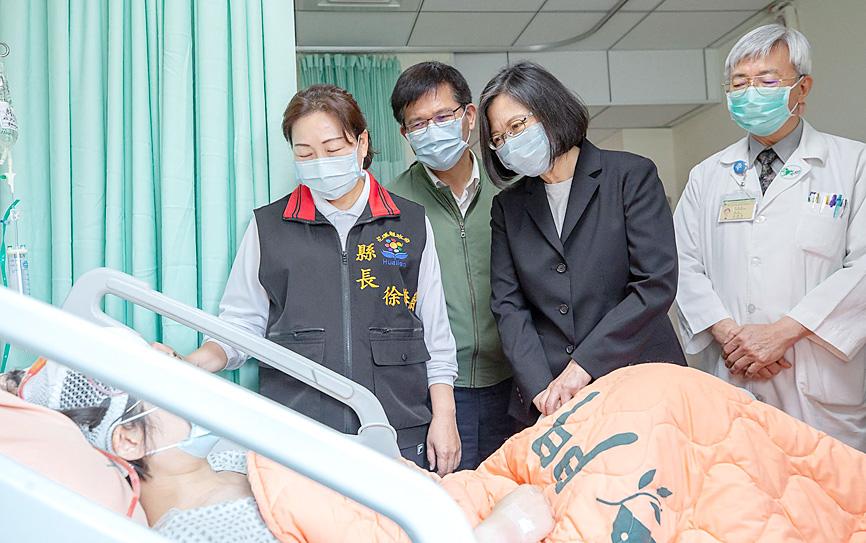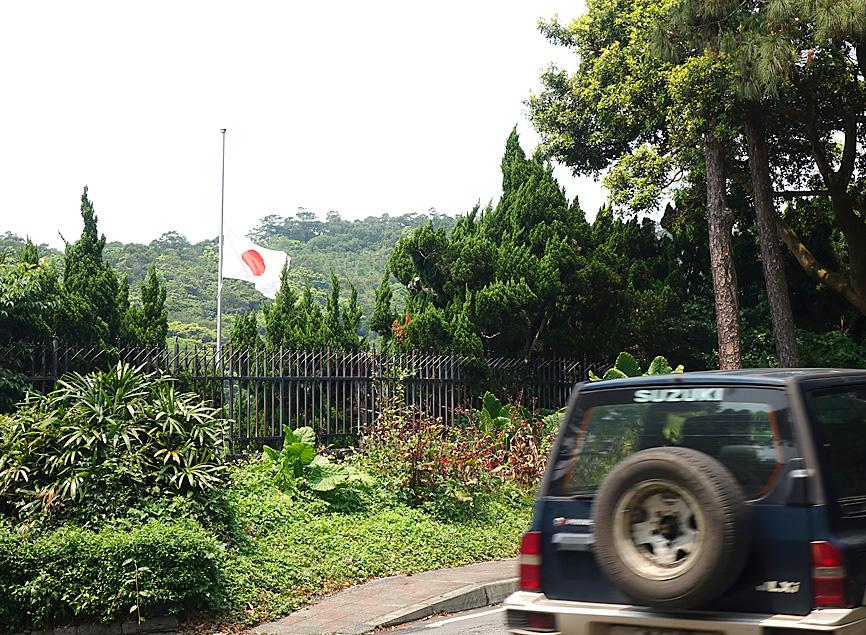President Tsai Ing-wen (蔡英文) and other officials yesterday visited people injured in the Taroko Express No. 408 train crash, as well as the families of those who died in the accident.
The government is to provide support for the victims and their families, they said.
Tsai, joined by Minister of Transportation and Communications Lin Chia-lung (林佳龍) and Minister of Health and Welfare Chen Shih-chung (陳時中), also visited a funeral home in Hualien City, where services were being held for the deceased.

Photo: Taiwan Presidential Office / AFP
The derailment — the nation’s worst railway accident in more than four decades — has killed 51 people and injured 188, as of 7pm yesterday.
Authorities on Friday said that a French national was among those killed, while an Australian and two Japanese had minor injuries.
The Ministry of Foreign Affairs yesterday said that two Americans had also died.

Photo: Wang Yi-sung, Taipei Times
The ministry was already in touch with representatives from the victims’ countries and the government would provide assistance, Tsai said.
Tsai thanked the rescue workers, as well as members of the public who helped with rescue efforts.
Government buildings are to keep flags at half-mast for three days to honor the victims, she said.
US Department of State principal deputy spokesperson Jalina Porter told a media briefing yesterday that the US was “deeply saddened by the loss of life and casualties” in the crash.
“We extend our deepest condolences to all those affected and stand ready to offer all possible assistance... We wish Taiwan peace and comfort during this difficult time,” she said.
Japanese Prime Minister Yoshihide Suga offered condolences in Chinese and Japanese on Twitter.
“I was deeply grieved when I received news of the accident. I wholeheartedly pray for the deceased to find happiness in the afterlife, and offer sincere condolences to the injured,” he wrote.
China Central Television yesterday quoted Chinese President Xi Jinping (習近平) as saying he was “deeply concerned” for the victims of the accident.
Separately, Chinese Nationalist Party (KMT) Chairman Johnny Chiang (江啟臣) yesterday wrote a response on Facebook to a statement from Lin, in which he said he would not resign over the incident, but would take “political responsibility.”
“I hope the government knows what political responsibility means. The transportation ministry and other officials must work their hardest to ensure people are safe when they travel,” he wrote.
“After all, nobody’s resignation can make up for 50 lost lives,” he added.
After rescue efforts are finished, the KMT will discuss with the Taiwan Railways Administration about how to make travel safer on its network, he said.
It could improve management of construction access roads along its routes, and supervise those who are entering areas near tracks, he wrote.
Chiang said he asked the director of the KMT’s Hualien County chapter, Chang Chun (張峻), to assist the victims and their families, and has asked Hualien County Commissioner Hsu Chen-wei (徐榛蔚) if Hsu needed any assistance.
Additional reporting by Shih Hsiao-kuang, Peng Wan-hsin and CNA

Alain Robert, known as the "French Spider-Man," praised Alex Honnold as exceptionally well-prepared after the US climber completed a free solo ascent of Taipei 101 yesterday. Robert said Honnold's ascent of the 508m-tall skyscraper in just more than one-and-a-half hours without using safety ropes or equipment was a remarkable achievement. "This is my life," he said in an interview conducted in French, adding that he liked the feeling of being "on the edge of danger." The 63-year-old Frenchman climbed Taipei 101 using ropes in December 2004, taking about four hours to reach the top. On a one-to-10 scale of difficulty, Robert said Taipei 101

A preclearance service to facilitate entry for people traveling to select airports in Japan would be available from Thursday next week to Feb. 25 at Taiwan Taoyuan International Airport, Taoyuan International Airport Corp (TIAC) said on Tuesday. The service was first made available to Taiwanese travelers throughout the winter vacation of 2024 and during the Lunar New Year holiday. In addition to flights to the Japanese cities of Hakodate, Asahikawa, Akita, Sendai, Niigata, Okayama, Takamatsu, Kumamoto and Kagoshima, the service would be available to travelers to Kobe and Oita. The service can be accessed by passengers of 15 flight routes operated by

Taiwanese and US defense groups are collaborating to introduce deployable, semi-autonomous manufacturing systems for drones and components in a boost to the nation’s supply chain resilience. Taiwan’s G-Tech Optroelectronics Corp subsidiary GTOC and the US’ Aerkomm Inc on Friday announced an agreement with fellow US-based Firestorm Lab to adopt the latter’s xCell, a technology featuring 3D printers fitted in 6.1m container units. The systems enable aerial platforms and parts to be produced in high volumes from dispersed nodes capable of rapid redeployment, to minimize the risk of enemy strikes and to meet field requirements, they said. Firestorm chief technology officer Ian Muceus said

MORE FALL: An investigation into one of Xi’s key cronies, part of a broader ‘anti-corruption’ drive, indicates that he might have a deep distrust in the military, an expert said China’s latest military purge underscores systemic risks in its shift from collective leadership to sole rule under Chinese President Xi Jinping (習近平), and could disrupt its chain of command and military capabilities, a national security official said yesterday. If decisionmaking within the Chinese Communist Party has become “irrational” under one-man rule, the Taiwan Strait and the regional situation must be approached with extreme caution, given unforeseen risks, they added. The anonymous official made the remarks as China’s Central Military Commission Vice Chairman Zhang Youxia (張又俠) and Joint Staff Department Chief of Staff Liu Zhenli (劉振立) were reportedly being investigated for suspected “serious